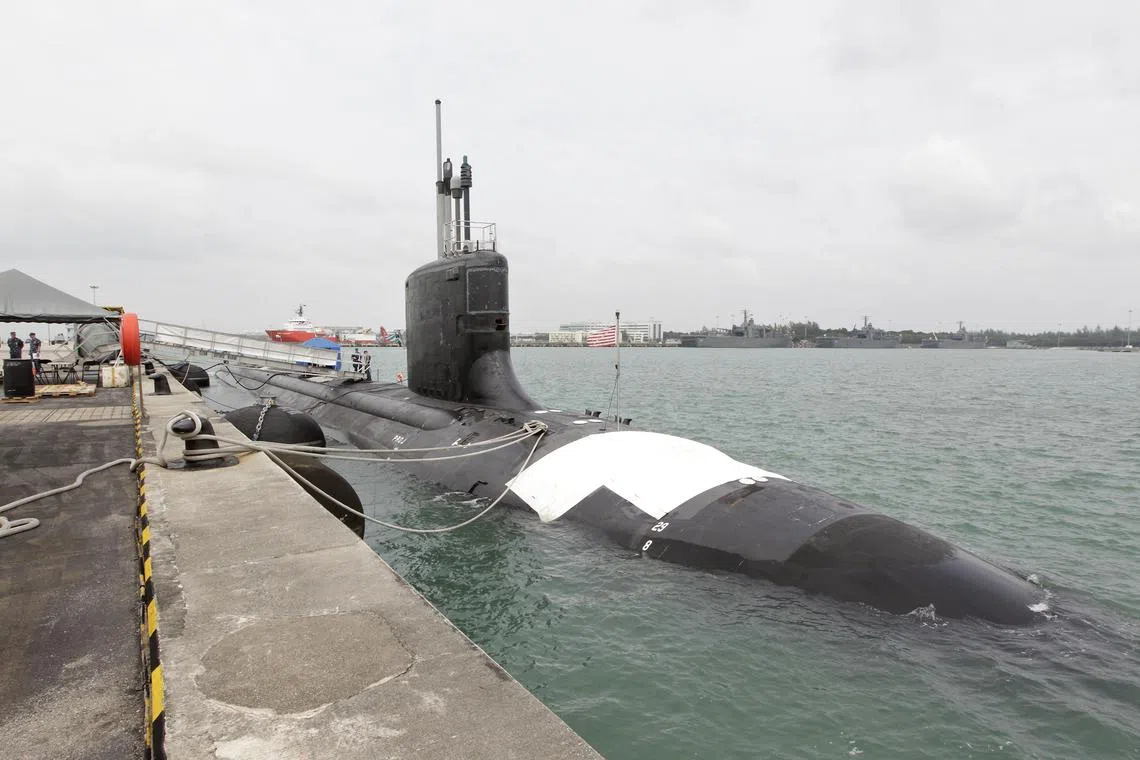Australian PM pushes ahead with plans for nuclear submarines despite concerns in the US
Sign up now: Get insights on Asia's fast-moving developments

Australia is considering buying ready-made Virginia-class nuclear-powered submarines from the US while it develops a new fleet.
PHOTO: ST FILE
SYDNEY – Australia’s plan to acquire nuclear-powered submarines from the United States has hit a hurdle amid concerns in Washington that the deal risks leaving the US without enough submarines for its naval needs.
Australia does not have nuclear weapons but is set to acquire nuclear-powered submarines from the US and Britain as part of the Aukus three-way security pact announced in 2021.
Following recent revelations that two powerful US senators had raised concerns about the deal, Australia’s Prime Minister Anthony Albanese said this week that he has engaged with members of the US Congress “in a really positive manner” to urge them to support Australia’s submarine acquisition.
“We are reliable partners… I’m confident going forward that we will have a positive outcome,” he told The Australian.
Australia is considering buying ready-made Virginia-class nuclear-powered submarines
However, lawmakers and officials in Washington have expressed concern that US shipyards will not be able to meet the US Navy’s demands if it supplies Virginia-class submarines to Australia.
Earlier in January, the website Breaking Defense revealed the contents of a leaked letter from senators Jack Reed and James Inhofe to US President Joe Biden, warning him that equipping Australia with nuclear submarines could damage America’s military capability.
“We believe current conditions require a sober assessment of the facts to avoid stressing the US submarine industrial base to the breaking point,” said the letter by Mr Reed, a Democrat and chairman of the Senate Armed Services Committee, and Mr Inhofe, a Republican, the past chairman.
Other members of Congress have also expressed concerns about the submarine deal. Republican House of Representatives member Rob Wittman recently said that Washington should not simply sell submarines to Australia due to the US’ own naval needs.
But this view is not unanimously held in Washington. Following the leaked letter from the senators, a bipartisan group of lawmakers wrote to Mr Biden, saying that selling submarines to Australia could provide funding that could be used to expand America’s shipbuilding capacity.
The debate has marked a relatively rare open schism between Canberra and Washington on a major strategic policy, despite Australia being a staunch ally of the US.
Mr Albanese has attempted to tread warily, saying that US concerns were “legitimate” but insisting that Australia could secure the submarines without damaging the interests of the US or Britain.
Defence Minister Richard Marles said Australia wants to develop its own capability to build nuclear-powered submarines to avoid stretching the industrial capacity of its allies.
“We understand that we will need to make our own contribution to the net industrial base of the three countries,” he told reporters. “We will be able to deliver this with support across the political systems of both the United States and the United Kingdom.”
But the plan to acquire nuclear-powered submarines has also attracted domestic criticism, including from two former Australian prime ministers, Mr Paul Keating from the Labor party and Mr Malcolm Turnbull, a Liberal. Both say the submarines will make Australia overly dependent on the US.
Mr Turnbull said Australia has no domestic nuclear industry and so would not have complete control of its own nuclear-powered submarines.
“Almost completely overlooked in Australia is the fact that nuclear-powered submarines to be acquired from the US will not be able to be operated or maintained without the supervision of the US Navy,” he said in a tweet last Monday.
Still, Mr Albanese is determined to proceed with the acquisition, signalling on Wednesday that the government was close to finalising its submarine announcement, as he told journalists that further updates can be expected in the coming months.
Australia on Wednesday also announced that it has ordered 40 US-made Black Hawk helicopters
“What we’re doing here is making sure that Australia has the best defence assets to defend our nation... And we think that this decision on Black Hawks is a positive one that will make a difference for supporting the defence of our nation,” Mr Albanese said.



